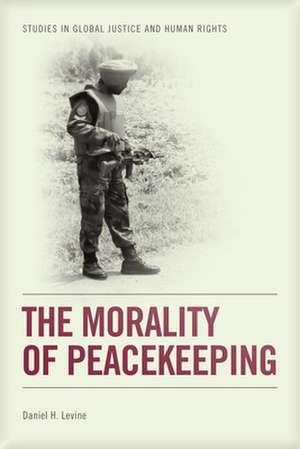The Morality of Peacekeeping: Studies in Global Justice and Human Rights
Autor Assistant Professor of Public Policy Daniel H Levineen Limba Engleză Hardback – 31 dec 2013
Preț: 587.34 lei
Preț vechi: 714.06 lei
-18% Nou
Puncte Express: 881
Preț estimativ în valută:
112.39€ • 117.64$ • 93.54£
112.39€ • 117.64$ • 93.54£
Carte disponibilă
Livrare economică 10-24 martie
Preluare comenzi: 021 569.72.76
Specificații
ISBN-13: 9780748675890
ISBN-10: 0748675892
Pagini: 362
Dimensiuni: 165 x 234 x 33 mm
Greutate: 0.75 kg
Editura: EDINBURGH UNIVERSITY PRESS
Colecția Edinburgh University Press
Seria Studies in Global Justice and Human Rights
Locul publicării:United States
ISBN-10: 0748675892
Pagini: 362
Dimensiuni: 165 x 234 x 33 mm
Greutate: 0.75 kg
Editura: EDINBURGH UNIVERSITY PRESS
Colecția Edinburgh University Press
Seria Studies in Global Justice and Human Rights
Locul publicării:United States
Notă biografică
Daniel H. Levine is an Assistant Professor of Public Policy at the University of Maryland, and a Research Fellow with the Center for International Security Studies at Maryland.
Descriere
What is the peacekeeper's role in the 21st century? Peacekeeping, peace enforcement and 'stability operations' ask soldiers to use violence to create peace, defeat armed threats while having no enemies and uphold human rights without taking sides. The justice of 'humanitarian intervention' and 'the responsibility to protect' fascinates analysts and practitioners alike when the world is watching crises unfold and wondering whether to step in. But once the cavalry has been sent in - often founded by wealthy nations, but with individuals from the developing world on the ground - less attention is paid to the moral challenges peacekeepers face. The traditional categories of just war theory provide insufficient guidance in this complicated moral landscape. Built on careful moral reflection and scores of interviews with peacekeepers, trainers and planners in the field, this book sheds light on the challenges of peacekeeping - challenges likely to be characteristic of an increasing number of military engagements. The book is also about how peacekeepers can meet those moral challenges through building genuine partnerships with people in conflict. It includes material based on over 50 interviews with soldiers, police, trainers and planners from Africa, Europe and the United States. It addresses difficult questions about practical implementation and provides guidance to peacekeepers on the ground.



















